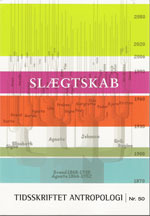SLAVERNES SLÆGT: Slægtshistorie som personlig fortælling og kritisk diskurs
DOI:
https://doi.org/10.7146/ta.v0i50.106939Resumé
The empirical focus of the article is on the serial, Slaves in the Family, which the
Danish TV channel, DR2, launched in January 2005. It is a serial of four programs on
Scandinavian descendants of slaves primarily from the former Danish colony of the
West Indies: St. John, St. Thomas and St. Croix. This serial is analysed with special
reference to the ways in which kinship is represented and the implications of these
forms of representation. The first part of the analysis focuses on three specific narratives
of kinship, which are presented during the serial. The question is how the participants
individually make sense of their consanguinity with slaves. The second part of the
analysis focuses on the serial’s overall narrative and the consequences, which the choice
of ‘kinship’ as a narrative device has for the construction of the story. It is argued that
the serial, by telling this story through the lens of kinship, partly undermines its own
proclaimed critical perspective. Rather than being a story of re-viewing history and
claiming responsibility for the atrocities, which were committed by the Danish state
and by other Danish agencies during colonial time, it becomes a story of re-uniting
family bonds which have been unrightfully torn apart. By this move, the categorical
distinction between white and black, Scandinavian and African, master and slave, is
denied, rather than transgressed and the potentially subversive story of the hybrid
descent of the Danes is displaced by a sentimental quest for a ‘true’ personal identity.
Downloads
Publiceret
Citation/Eksport
Nummer
Sektion
Licens
Ophavsretten til artiklerne i Tidsskriftet Antropologi tilfalder forfatteren.
Artikler publiceret i Tidsskriftet Antropologi må citeres, downloades og videresendes for ikke-kommerciel brug, under forudsætning af normal akademisk reference til forfatter(e) samt tidsskrift, årgang, nummer og sider. Artiklerne må kun genudgives med eksplicit tilladelse fra forfatter(e) og tidsskriftet.


